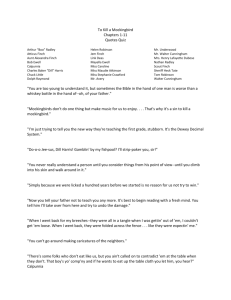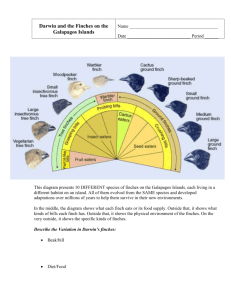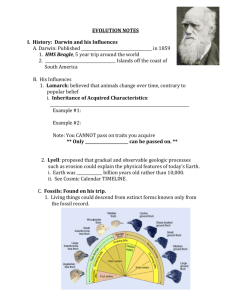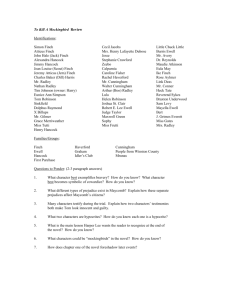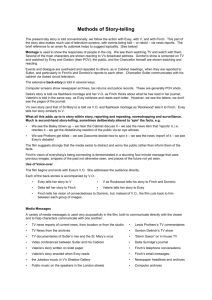Inspector Finch: Analysis of V for Vendetta Character
advertisement
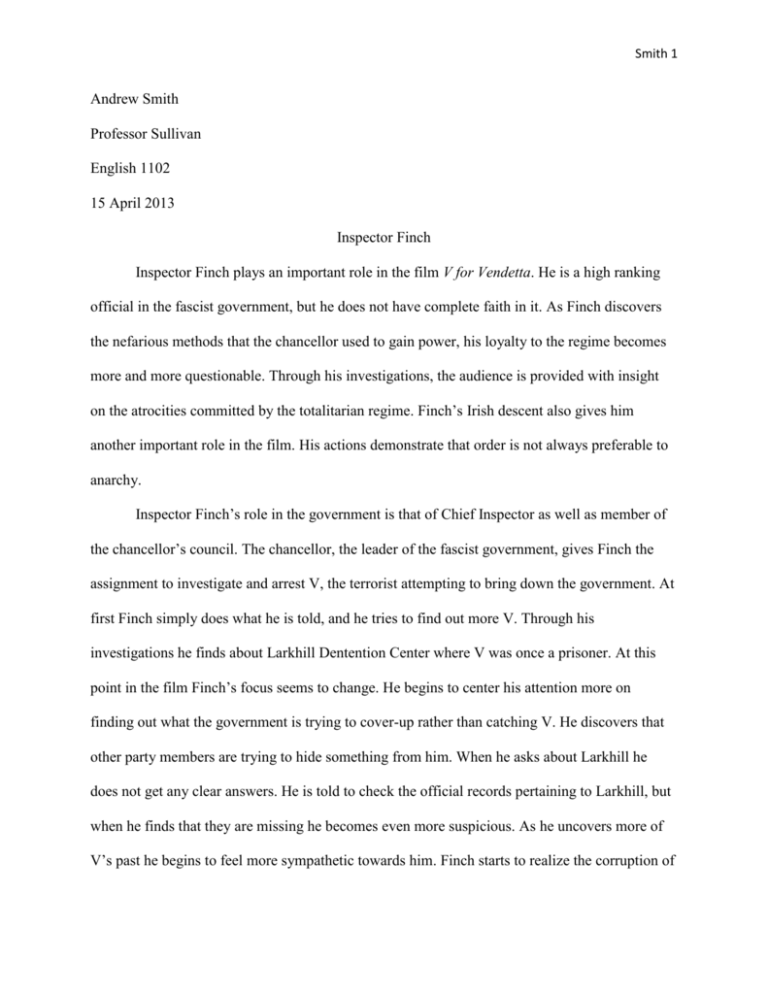
Smith 1 Andrew Smith Professor Sullivan English 1102 15 April 2013 Inspector Finch Inspector Finch plays an important role in the film V for Vendetta. He is a high ranking official in the fascist government, but he does not have complete faith in it. As Finch discovers the nefarious methods that the chancellor used to gain power, his loyalty to the regime becomes more and more questionable. Through his investigations, the audience is provided with insight on the atrocities committed by the totalitarian regime. Finch’s Irish descent also gives him another important role in the film. His actions demonstrate that order is not always preferable to anarchy. Inspector Finch’s role in the government is that of Chief Inspector as well as member of the chancellor’s council. The chancellor, the leader of the fascist government, gives Finch the assignment to investigate and arrest V, the terrorist attempting to bring down the government. At first Finch simply does what he is told, and he tries to find out more V. Through his investigations he finds about Larkhill Dentention Center where V was once a prisoner. At this point in the film Finch’s focus seems to change. He begins to center his attention more on finding out what the government is trying to cover-up rather than catching V. He discovers that other party members are trying to hide something from him. When he asks about Larkhill he does not get any clear answers. He is told to check the official records pertaining to Larkhill, but when he finds that they are missing he becomes even more suspicious. As he uncovers more of V’s past he begins to feel more sympathetic towards him. Finch starts to realize the corruption of Smith 2 the current regime, and he feels guilty that he is a part of it. This eventually leads up to his decision at the climax of the film. When he confronts Evey, V’s protégé and the main protagonist, as she is about to send the train loaded with explosives to Parliament, he has a choice to make. He has to decide whether the government is worth saving or not. In the end, he does not stop Evey. According to research student Douglas Bulloch Finch “[Finds] himself with the means to stop the destruction of parliament, but [lacks] the will” (434). Bulloch is saying that even though Finch has the opportunity to save the establishment he is a part of, he cannot think of any good reason to do so. Finch recognizes even anarchy is better than order at the cost of freedom. Finch’s role in taking down the government is the most important next to Evey’s and V’s. His role in destroying Parliament first becomes noticeable when he is approached by V in the guise of Mr. Rookwood. V helps confirm the Inspector’s suspicion that High Chancellor Sutler was behind a terrorist attack. V then tells Finch he will cooperate with him only once he puts Creedy under twenty-four hour surveillance. V does this to make sure he can trust Finch. This scene is the turning point for Finch. Before this he only had a strong suspicion that the government was behind the spread of the deadly virus. V’s story gives Finch Sutler and Creedy’s motives for killing thousands of innocents as well as the means. Finch proves that V’s faith in him is not misplaced when he allows Evey to destroy Parliament. While he had nothing to do with the planning or setup, he had the power to save Parliament or let it be destroyed. His decision undoubtedly creates a better society in the film. At the end of the movie when all the people are watching the fireworks they take their masks off. This represents that they no longer have to hide from their own government anymore. Before the destruction of Parliament, common citizens cannot draw attention to themselves or else they risk the government kidnapping them Smith 3 labeling them a terrorist. For homosexuals and those of other religions the persecution is even worse. They were unable to be of a different sexual orientation or practice their own religion without being arrested. Finch allowing Parliament to be destroyed provides a symbol for the people to rally behind. This symbol shows the common man that they can stand up to the government. Looking at Finch’s role as a character in the film, he serves the purpose of helping the audience follow the story. As Finch learns more about V and Larkhill, so too does the audience. His investigations help the audience understand many of the details of V’s past. The investigations also give the viewer a glimpse into Evey’s. This insight helps the audience understand Evey’s development as a character, and comprehend how her past parallels her present. Finch V for Vendetta can be tricky to follow at times and Inspector Finch’s character help clarify what is happening to the audience. For example, Finch uncovers evidence that indicates Chancellor Sutler and Creedy, the Minister of Security, are the one behind the terrorist attacks that help Sutler rally political support. It is not completely obvious to the audience that this conspiracy is what is implied by the evidence. As a result, Finch then makes this clearer by asking his assistant “if our government was responsible for the deaths of almost a hundred thousand people would you really want to know?” (V for Vendetta). This quote shows the audience true nature of the government in V for Vendetta. It also makes clear to the viewer that Finch is seriously questioning his loyalty to his party. In this manner, Finch aids the viewer in understanding how both onscreen and off-screen events pertain to the overall plot. It is important to note that Inspector Finch is the only one of the High Chancellor’s ministers that is Irish. Creedy reveals to the audience that Finch is half Irish when he asks “Your Mother was Irish, wasn’t she?”. Finch’s final act allowing the destruction of parliament is wish Smith 4 fulfillment for the Irish. The fact that an Irishman is responsible for parliament’s demolition can be seen as revenge for all the decades of the British oppressing the Irish. Historically, the Irish were oppressed as long as they were controlled by the British. British Subjugation of the Irish can be said to date as far back as the 12th century when the Anglo-Normans first Conquered Ireland. Inequalities between Irish peasants and English landlords since then, but they became more noticeable in the 17th to 18th centuries after the protestant reformation in England. The English made laws that made it illegal for Catholics, the majority of the Irish, to enter military service, hold public office, own land, or pass on their land to their children without dividing it. These laws made the vast majority of the Irish Catholic population into destitute beggars. The fact that Finch is of Irish descent means that he has a better reason than most people to mistrust the government. Because of Finch’s lineage, it is easy to draw parallels between him and famous Irish playwright Oscar Wilde. Wilde was a homosexual and was also a victim of the laws against homosexual behavior at the time. He was found guilty of gross indecency with other men and sentenced to two years in prison. It can be seen as ironic that a government establishment that oppresses the Irish and homosexuals like Oscar Wilde is allowed to be destroyed by another Irishman like Finch. Inspector Finch is the one member for the totalitarian state government that realizes it must be destroyed. If Finch were given the same decision to save or allow Evey to oppression destroy Parliament at the beginning of the film he would have saved it. At first Finch believes that order of an oppressive kind is still better than any form of chaos. As the film progresses he comes to realize how the fascist regime is hurting society. In a sense, Finch plays the role of the government allowing itself to be destroyed when it no longer serves the needs of Smith 5 the people. Finch’s character shows that a government that neglects the wishes of its citizens in the name of order is worse than anarchy. Smith 6 Works Cited Bulloch, Douglas. “V is For Vendetta: P Is For Power A Film Reading of V For Vendetta.” Millennium (03058298) 35.2 (2007): 431-434. Academic Search Complete. Web. 21 Apr. 2013 Fisher, Kirsten. "A Brief Irish History."Haderslev Katedralskole. N.p., n.d. Web. 20 Apr. 2013. Ott, Brian L. “The Visceral Politics Of V For Vendetta: On Political Affect In Cinema. “Critical Studies In Media Communication 27.1 (2010): 39-54, Academic Search Complete. Web. 21 Apr. 2013.

